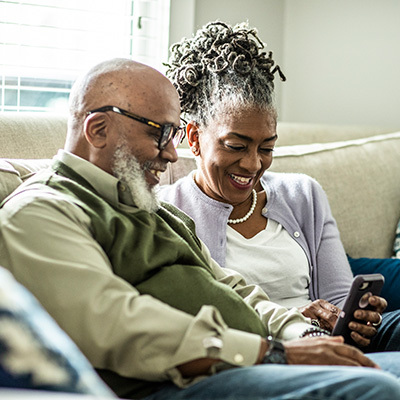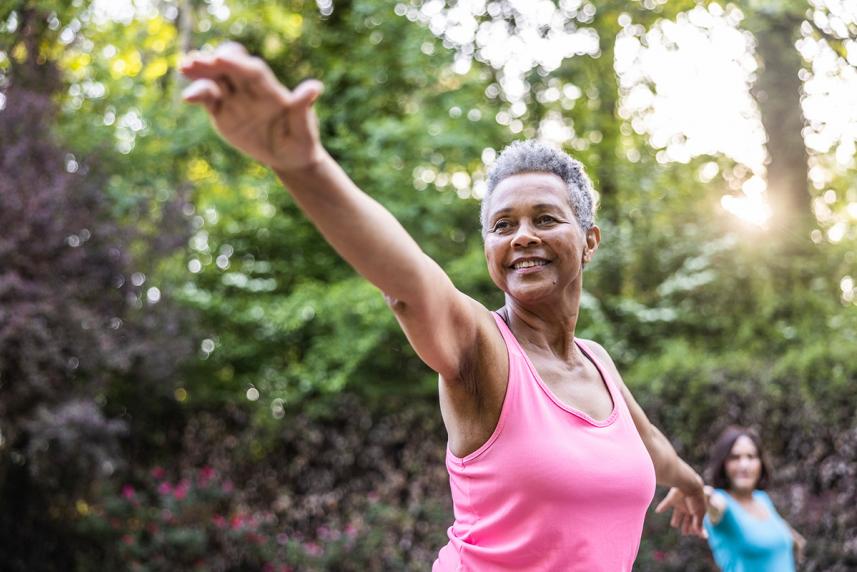
Find out if you qualify for an Aetna® Dual Eligible Special Needs Plan — we’re ready to help.
Osteoporosis is often associated with older women. But it can affect anyone at any age. Take this quick quiz to learn your risk and what you can do to keep your bones healthy.

Our bones are the unsung heroes of our bodies. They help us walk and move through life. But when we hit our late 20s, our bones are as strong and dense as they’ll ever be. In the years that come, we slowly start losing bone.* Osteoporosis — a disease that weakens bones and makes them more likely to break — is very common as we get older. One in two women will break a bone due to osteoporosis in their lifetime. So will up to one in four men.*
Unfortunately, bone loss can start sooner than you might think. Half of Americans over age 50 are at risk for breaking a bone. This is due to low bone density, according to the National Osteoporosis Foundation.* And in older people, fractures can lead to long-lasting problems. One study found that older people with hip fractures had a higher risk of death during the 10 years after their injury. Those who fractured other bones, such as the legs, had a higher risk of death for five years afterward.*
Thankfully, you’re not guaranteed to get osteoporosis, says Kristen Vealey, MD. She’s an internist at Illinois-based Duly Health and Care. “Many people believe that osteoporosis is a natural part of aging,” Dr. Vealey says. “This isn’t true. A healthy diet, regular exercise and maintaining a healthy lifestyle can have a big impact.” Even people who do have osteoporosis can manage the condition by making healthy choices.*
Knowing your risk of osteoporosis is the first step toward keeping your bones healthy. It helps you see what you can do to have the biggest impact on preventing bone loss. To start, take our simple quiz below.

Find out if you qualify for an Aetna® Dual Eligible Special Needs Plan — we’re ready to help.
A: Yes
B: No
If you answered yes, your risk for osteoporosis is higher than that of both women who haven’t gone through menopause and men.* That’s because during menopause, the female hormone estrogen falls to a very low level. Estrogen helps bones grow and stay strong.* So when your levels drop, your bones may become more frail. That means you’re more prone to fractures and osteoporosis.*
To keep tabs on your bone health, the American College of Obstetricians and Gynecologists recommends that women 65 and older get a bone mineral density test. Women under 65 who are past menopause should also get a test if they have other risk factors. Your doctor can tell you what’s best for you. You should get a test every 15 years if bone mass is normal or you have only mild loss. You may need testing more often if your bone loss is greater.
A: Yes
B: No
Skipping exercise or doing only activities where you’re off your feet (swimming, stretching or riding a bike, for example) puts your bones at higher risk for fracture. Why? Weight-bearing exercises are best for slowing bone loss. Activities in which your bones support your weight include:*
The reason it helps: Putting stress on your bones causes your body to build stronger, denser bones. It tells cells that build bones to get to work.*
“Aim for 20 to 40 minutes of weight-bearing exercise at least four days per week,” says rheumatologist Alan R. Schenk, MD. He’s a clinical professor of medicine at the University of California, Irvin. But don’t stop doing things that help you stay flexible and build balance. For instance, stretching or yoga. They can help you stay steady on your feet, reducing your fall risk and the chances you’ll break a bone.*
A: Yes
B: No
Add weaker bones to the long list of ways smoking can harm your body.* Here are some of the ways smoking is bad for bones:*
If you smoke, it’s best to quit as soon as possible for your bone health (and so much more).
A: Yes
B: No
Osteoporosis tends to run in families. If you have a parent or sibling with osteoporosis, or a parent who fractured a hip, you’re at a higher risk than someone without that family history.* If you inherited your mother’s delicate wrists, you may also be more likely to have weaker bones later in life. People with smaller frames are at higher risk for osteoporosis than people with other body types.*
A: Type 1 diabetes
B: Lupus
C: Rheumatoid arthritis
People with any of these autoimmune diseases have a higher risk for bone loss and osteoporosis. (These are conditions that cause the immune system to overreact to certain triggers, causing unpleasant, sometimes dangerous symptoms.) Medicines used to treat those diseases, such as steroids, can sometimes speed up bone thinning as well.*
For these reasons, people with autoimmune diseases should talk to their doctors. They may need testing at a younger age. It can lead to earlier detection, says Dr. Vealey, and when necessary, early treatment. All of which can help you stay mobile well into your later years.*
A: Yes
B: No
Calcium is key for healthy bones. Our bodies don’t make it, so it’s extra important to get enough from your diet. Aim for 1,000 to 1,200 mg of calcium daily, Dr. Schenk says. Also key: vitamin D, which helps us absorb calcium. A simple blood test will help determine how much vitamin D you need. Talk to your doctor for advice on calcium and vitamin D.*
People with osteoporosis can lead healthy, active lives when they take proactive steps to protect their bones. Exercising regularly and eating well can keep your bones healthy. If you’ve already received an osteoporosis diagnosis, medications may help too. Talk to your doctor about your personal risk factors and when to start screenings.*
If you qualify for both Medicare and Medicaid, you may be eligible for an Aetna Dual Eligible Special Needs Plan (D-SNP).
If you're 65 or older and have diabetes or an eligible heart disease, you may qualify for an Aetna Chronic Condition Special Needs Plan (C-SNP). C-SNPs are currently available in select counties in IL and PA.
You may be eligible for an Institutional Special Needs Plan (I-SNP) if you’ve lived (or plan to live) in a participating facility for 90+ days or you have Medicare Part A (hospital insurance) and Part B (medical insurance).
*FOR AGING AND BONE LOSS: American Academy of Orthopaedic Surgeons. Healthy bones at every age. August 2021. Accessed September 26, 2024.
*FOR OSTEOPOROSIS FACTS: National Osteoporosis Foundation. Osteoporosis fast facts. Accessed September 26, 2024.
*FOR RISKS ASSOCIATED WITH BREAKING BONES: Tran T, Bliuc D, Hansen L et al. Persistence of excess mortality following individual nonhip fractures: a relative survival analysis. The Journal of Clinical Endocrinology & Metabolism. September 2018; 103(9): 3205-3214. Accessed September 26, 2024.
*FOR OSTEOPOROSIS FACTS RELATED TO CALCIUM, VITAMIN D, MENOPAUSE, SMOKING AND BODY TYPE: Mayo Clinic. Osteoporosis. August 21, 2021. Accessed September 26, 2024.
*FOR RESEARCH ON FRACTURES, HORMONE LEVELS, CALCIUM, VITAMIN D AND BODY TYPE: National Institute of Arthritis and Musculoskeletal and Skin Diseases. Osteoporosis overview. October 2019. Accessed October 11, 2023. Accessed September 26, 2024.
*FOR EXERCISES THAT HELP SLOW BONE LOSS: Mayo Clinic. Exercising with osteoporosis: stay active the safe way. June 5, 2021. Accessed September 26, 2024.
*FOR THE RESEARCH ON WEIGHT-BEARING EXERCISE AND BONE LOSS: Harvard Medical School Harvard Health Publishing. Slowing bone loss with weight-bearing exercise. April 11, 2021. Accessed September 26, 2024.
*FOR WHY SMOKING IS BAD FOR YOUR BONES: Rush University System for Health. Bad to the bones. Accessed September 26, 2024.
*FOR DIABETES AND OSTEOPOROSIS: National Institute of Arthritis and Musculoskeletal and Skin Diseases. What people with diabetes need to know about Osteoporosis. November 2018. Accessed September 26, 2024.
*FOR LUPUS AND OSTEOPOROSIS: National Institute of Arthritis and Musculoskeletal and Skin Diseases. What people with lupus need to know about Osteoporosis. November 2018. Accessed September 26, 2024.
*FOR RHEUMATOID ARTHRITIS: National Institute of Arthritis and Musculoskeletal and Skin Diseases. What people with rheumatoid arthritis need to know about osteoporosis. November 2018. Accessed September 26, 2024.
Aetna Medicare is a HMO, PPO plan with a Medicare contract. Our DSNPs also have contracts with state Medicaid programs. Enrollment in our plans depends on contract renewal.
Plan features and availability may vary by service area.
Participating health care providers are independent contractors and are neither agents nor employees of Aetna. The availability of any particular provider cannot be guaranteed, and provider network composition is subject to change.
For mail-order, you can get prescription drugs shipped to your home through the network mail-order delivery program. Typically, mail-order drugs arrive within 14 days. You can call the phone number on your member ID card if you do not receive your mail-order drugs within this timeframe. Members may have the option to sign-up for automated mail-order delivery.
To send a complaint to Aetna, call the plan or the number on your member ID card. To send a complaint to Medicare, call 1-800-MEDICARE (TTY users should call 1-877-486-2048), 24 hours a day/7 days a week. If your complaint involves a broker or agent, be sure to include the name of the person when filing your grievance.
For accommodation of persons with special needs at meetings, call 1-833-278-3924 (TTY: 711).
The benefits mentioned are part of special supplemental program for the chronically ill. Eligibility is determined by whether you have a chronic condition associated with this benefit. Standards may vary for each benefit. Conditions include Hypertension, Hyperlipidemia, Diabetes, Cardiovascular Disorders, Cancer. Other eligible conditions may apply. Contact us to confirm your eligibility for these benefits. Eligibility for the Model Benefit or Reward and Incentive (RI) Programs under the Value-Based Insurance Design (VBID) Model is not assured and will be determined by Aetna after enrollment, based on relevant criteria (e.g., clinical diagnoses, eligibility criteria, participation in a disease state management program).
Nondiscrimination Notice | CA-Specific Nondiscrimination Notice
©2025 Aetna Inc.
Y0001_3983252_2025_M
4075907-07-01
Call us at 1-844-514-8290 (TTY: 711) between 8 AM and 8 PM, Monday to Friday. Or visit AetnaMedicare.com/YourDSNP anytime.